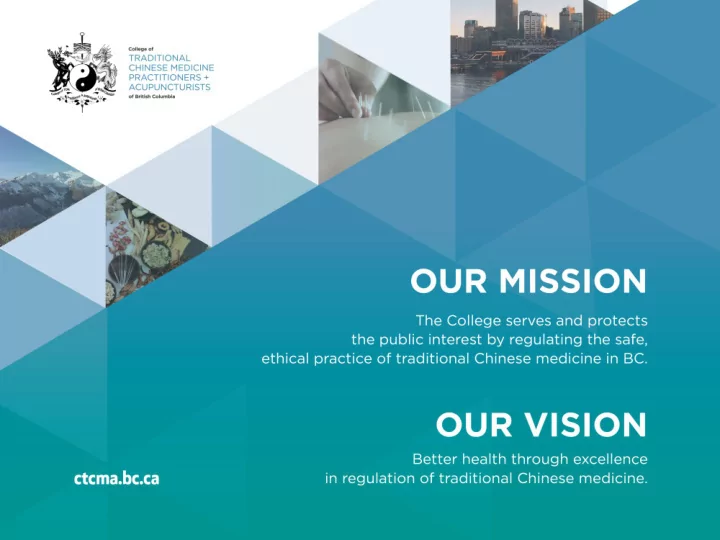

GOVERNING IN THE PUBLIC INTEREST? Board of Directors November 15, 2019 Carl Roy, Chair
GOVERNING IN THE PUBLIC INTEREST? CTCMA Board March 7, 2020 Peter Stevenson-Moore, Chair
THE REGULATORY ENVIRONMENT ➢ International change that has moved away from professional self- regulation to publicly legislated regulation with public participation. ➢ No longer are professionals blindly trusted to make the “best” decisions for their patients. ➢ The internet has become the ubiquitous influence on all of us providing information and transparency where previously there was none. ➢ Healthcare is frequently seen more as a product for sale than as the imperfect application of evidence-based learning for the potential benefit of imperfect patients.
QUESTIONS: ➢ What is the public interest? ➢ What is not the public interest ➢ How can we keep the public interest?
WHAT WE ARE: ➢ We are a government entity and decisions about our mandate always remain their purview ➢ We govern in the public interest by consistent application of the Health Professions Act independent of government influence ➢ Knowing our mandate and ensuring it focuses on organizational activities and decisions ➢ We govern by putting citizens first, at the centre of decision-making, and ensure fairness for all
WHAT WE ARE NOT: ➢ Private interests ➢ Personal interests ➢ Professional interests ➢ Personal curiosity ➢ Personal opinions ➢ Parochial interests ➢ Partisan political interests
THE PUBLIC INTEREST IS: ➢ Where the public trusts and feels protected by public institutions and where competing interests are balanced and managed effectively and fairly ➢ Fiduciary duty and oversight: “Fiduciary” - Legal term refers to relationship of trust ▪ Trusted to take care of resources and assets on behalf of someone else ▪ Responsible for things we do not own
WELFARE AND SAFETY OF BROADER PUBLIC ➢ Put the interests of citi citizens at the centre of decision- making ➢ Behave with integrity, demonstrate strong commitment to ethical values, and respect for the rule of law ➢ Ensure openness and respectful engagement with all citizens ➢ Strive for outcomes that support healthy communities in British Columbia, including social, economic and environmental well-being ➢ Implement actions to achieve the organization’s mandate
QUESTIONS FOR ALL BOARD MEMBERS ➢ What’s best for those who access TCM services? ➢ What do BC citizens’ experience when they interact with CTCMA? ➢ How will this affect the public? Who has been consulted? ➢ Does this operational decision balance different interests in a way that is fair and aligned with our mandate?
QUESTIONS FOR ALL BOARD MEMBERS ➢ How can we best ensure that we keep the public interest?
QUESTIONS FOR ALL BOARD MEMBERS ➢ Does the public know what we do, how we do it and why? ➢ What impact does information and privacy legislation have on our ability to be transparent? ➢ What impact does research and new technology have on our activities? How might this impact our stakeholders? ➢ What are government’s priorities and expectations?
QUESTIONS FOR ALL BOARD MEMBERS ➢ What’s the most important thing we should be talking about right now? ▪ Can we pause for a moment and make sure this is the right conversation to have? ▪ Are there any other perspectives or questions we should be asking about this proposed action? ➢ When it comes to this issue, where does our role start and where does it end? ➢ Where do we, as appointees, have a say? Where don’t we have a say? ➢ What is actually being asked of us?
QUESTIONS FOR ALL BOARD MEMBERS ➢ Does our board work effectively? ➢ Does our board govern the organization effectively? ➢ How will we accomplish our transformative agenda? ➢ How can I make a personal contribution to achieving our goals on behalf of the public?
OUR PUBLIC PROMISE Guiding Principles ➢ Everything the College does must clearly link to public protection. ➢ The College belongs to the public of British Columbia. Practitioners do not own the College. ➢ The Board recognizes and respects the professional staff as trusted partners in public protection ➢ Leadership at the Board and committee level is shared between public and health professionals regulated by the College – current and future. ➢ Transparency is our default position. ➢ The involvement of patients and the public in College activities is invited and expected. ➢ A shift in culture is required. This means asking ourselves hard questions and moving away from old ways of thinking.
GOVERNING IN THE PUBLIC INTEREST - REFERENCES ➢ BC Ministry of Health, Governing in the Public Interest: Foundational Training for BC Public Sector Appointees, Crown Agencies and Board Resourcing Office, May 2019. ➢ Chris Wheeler, The Public Interest: We Know It’s Important, But Do We Know What it Means? AIAL Forum No. 48. ➢ Allan C Hutchinson, In the Public Interest: The Responsibilities and Rights of Government Lawyers, Osgoode Hall Law School of York University, Osgoode Hall Law Journal 46.1 (2008): 105-129 ➢ Multiple Google references on Governing in the Public Interest, two of which are cited below: ▪ Jane Johnston, Associate Professor in Communication and Public Relations, The University of Queensland. ▪ The Australian Law Reform Commission.
Recommend
More recommend